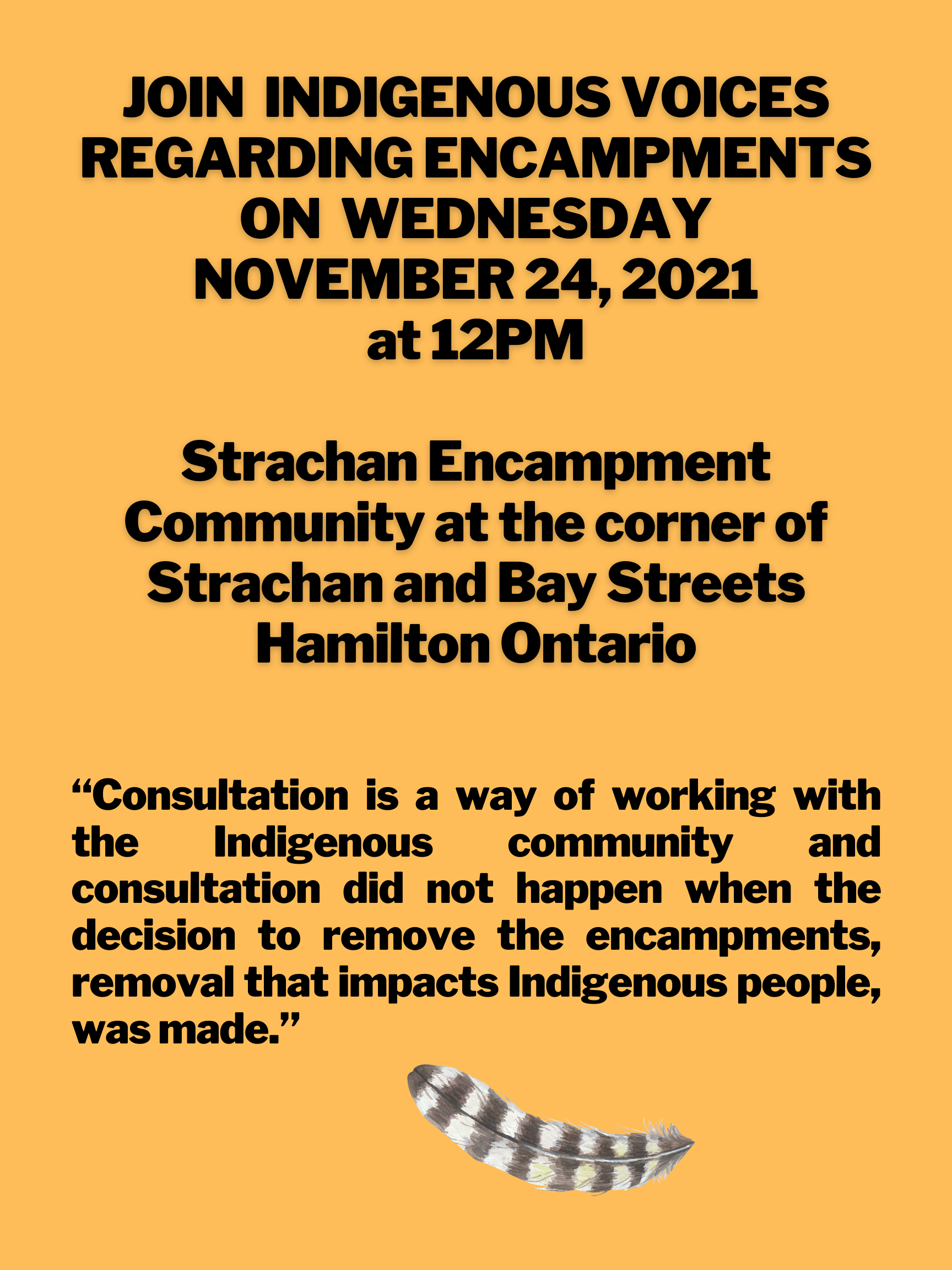
Indigenous people see the impacts of colonization on a daily basis. We are assured to either hear, see or feel these impacts of colonialism, racism and discrimination every single day. Ongoing colonial and systemic policies continue to disproportionately impact the lives of Indigenous peoples across Turtle Island, including within the City of Hamilton.
Canada continues to oppress Indigenous people through the use of harmful colonizing polices.
These policies include the doctrine of discovery, the Indian Act, the 60’s scoop, residential schools, child welfare systems and the colonial legal system.
The Assembly of First Nations notes: “The Doctrine of Discovery emanates from a series of Papal Bulls (formal statements from the Pope) and extensions, originating in the 1400s. Discovery was used as legal and moral justification for colonial dispossession of sovereign Indigenous Nations, including First Nations in what is now Canada. During the European “Age of Discovery”, Christian explorers “claimed” lands for their monarchs who felt they could exploit the land, regardless of the original inhabitants. This was invalidly based on the presumed racial superiority of European Christian peoples and was used to dehumanize, exploit and subjugate Indigenous Peoples and dispossess us of our most basic rights. This was the very foundation of genocide. Such ideology led to practices that continue through modern-day laws and policies.”
The Indian Act was created in 1876. The main goal of the Act was to force the First Nations peoples to lose their culture and become like Euro-Canadians, otherwise referred to as forced assimilation. The Indian Act has been changed many times and it is still an oppressive tool of the Canadian government. It does not affect either the Métis or Inuit.
These tools of the colonial project have led to Indigenous people’s loss of land, language, identity, and way of life.
A clear example of the policies that cause harm is the recent court ruling that enables the local municipal government of Hamilton to forcibly remove homeless people from public spaces. This violent act further displaces encampment residents, destroys any sense of safety and/or security by dismantling the only place they call home and violently disposing of personal belongings. Replicating 500 years of police and government sanctioned colonial violence.
Indigenous people are over-represented in Hamilton’s encampment population.
The Truth and Reconciliation Calls to Action have been committed to by the government of Canada to try to rectify some of the wrongs done to Indigenous people. It is a tool we use to remind that there is a necessity to work with Indigenous people and communities to change the way things are done and reduce the harm. Consultation is a way of working with the Indigenous community and consultation did not happen when the decision to remove the encampments, removal that impacts Indigenous people, was made.
Hamilton and Burlington lie within the Haudenosaunee and Anishinaabe territories and fall under the dish with one spoon and the two row wampum treaty agreements. Treaties are binding agreements between two groups and there are responsibilities to all that these agreements include. Have municipal governments forgotten they are treaty partners? Or have they failed to ever acknowledge and put this relationship into practice?
This is an important point that we all need to recognize; each and every person here has a responsibility to educate themselves, support reconciliation and understand our treaty obligations. The education system has proven to have failed Indigenous peoples and been used as a tool of colonialism. We have seen how the education system has failed through the confirmation of unmarked graves at residential schools that has made the news headlines for months and many Canadians just learning about these acts of genocide. We are in charge of our own education and it is no longer acceptable to say “I didn’t know”. Ignorance is not bliss.
We recognize our roles and responsibilities and are speaking out against the mistreatment of our brothers and sisters who have had to make encampments their homes. The Indigenous way of being, our way of life and our roles and responsibilities DO NOT INCLUDE treating other human beings with such disrespect to dismantle their homes and toss their material possessions to the garbage. This is not how we manage our relationships with others. Our way of being includes consultation, compassion, empathy, caring and love.
Removing the encampments without alternatives for those displaced is taking away the spoon. When we take away the spoon, we are feeling privileged enough to interpret the treaty, Dish with one Spoon, in a manner that justifies our behaviours and accommodates only our needs and wants. This was not the intent of the treaty on Indigenous land. No one is privileged to interpret the treaty to benefit only them and this includes elected officials such as mayors and council members as well as policing agents who carry out their mandates.
It is our responsibility to remind Canadians that you are on Indigenous territories and we have agreements that are older than ourselves, older than any colonial law. Through these agreements we have roles and responsibilities to each other and the land. Wearing an Orange Shirt one day and violently dismantling encampments the next is a contradiction, example of a performative stunt with no real intention for true systemic transformative change to ensure we are upholding treaty obligations and working towards reconciliation.
If the City of Hamilton is truly committed to working towards reparation and reconciliation then the removal of the statue of Victoria, your Queen, is essential to ending the oppression that a majority of city council embraces toward Indigenous people. By not having her already removed reminds us that the city is not hearing the voices of Indigenous people and they continue to trigger Indigenous people with the same trauma, plus, associated with the John MacDonald statue. TAKE DOWN YOUR QUEEN. Indigenous people do not need constant reminders of genocide.
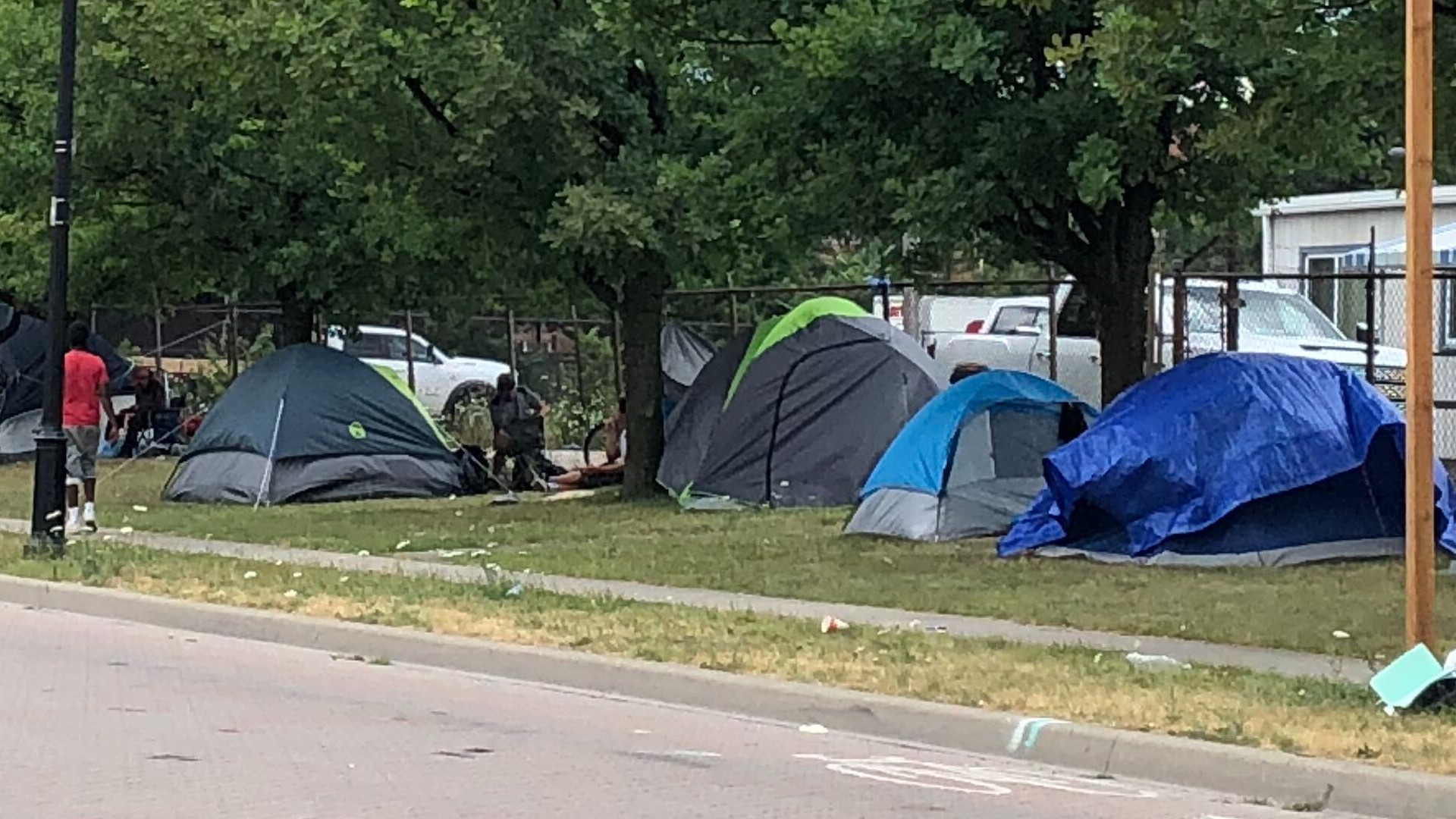
We are disheartened that the Court considered the desperate act of sleeping in an encampment as a choice. We are concerned that this decision risks perpetuating the stigmatization of the unhoused population. By the City’s own admission, shelters are full and are unable to meet peoples’ disability related needs. This gap often results in people being denied entry or kicked out. This segment of the population will now be left to sleep outside in harms’ way, without the use of a tent to shield them from the harsh elements. Some will move further off the grid and into hiding, disconnecting from vital supports like medical and street outreach.
While we disagree with the decision, we are encouraged that there has been increased public attention and criticism of Hamilton’s mistreatment of individuals in encampments, particularly in contrast to other innovative and compassionate municipalities that have expanded shelter options and provided food, social workers, mental health crisis worker, potable water and bathroom facilities. Going forward, we hope that the City will adopt similar creative solutions to ensure the safety and wellbeing of the community.
This decision is not an endorsement or a license for the City to aggressively and violently evict homeless persons into a cycle of displacement. The City must refrain from the aggressive and heavy handed displacement tactics seen in Toronto. It must ensure that people have an actual indoor space option before being told to move along. It must increase the number of shelter spaces, particularly for women and couples. It must urgently provide low barrier shelter options so that individuals are not repeatedly kicked out. It must prioritize investment in affordable, supportive housing, refrain from enacting policies that contribute to homelessness, and seek funding from other levels of government to actually meet the needs of the unhoused community.
Despite not granting the injunction, the judge confirmed that there is a triable Charter issue. The full Charter challenge remains the next step in this matter, should the City continue to fail to meet the needs of the unhoused population.
The bottom line is that, despite the Court’s decision, there remains a segment of Hamilton’s population, the most vulnerable, who have nowhere else to go. We are hopeful that the City will commit to an ongoing dialogue with community stakeholders and prioritize addressing the housing crisis over the enforcement and displacement of homeless individuals.

We are pleased to present the community HCLC’S 2021 Annual Report. Please see the link below!

For immediate release
HAMILTON, ON, August 8, 2021 — The Hamilton Community Legal Clinic (HCLC) congratulates our Executive Director, Hugh Tye, on more than thirty years of service to Ontario’s legal clinic system on the eve of his retirement.
Hugh was called to the bar and joined the Centre for Spanish Speaking Peoples as a staff lawyer in 1988. In 1990 he joined Hamilton Mountain Legal & Community Services, where he took the reins as Executive Director in 1995.
Hugh has led HCLC as Executive Director since its inception in 2010 with the amalgamation of three clinics: Dundurn Community Legal Services, Hamilton Mountain Legal & Community Services and McQuestern Legal & Community Services.
During this time he has led initiatives to improve access to justice for historically marginalized communities, like YÉN:TENE (You and I will go there together) with Indigenous partners, Hamilton Legal Outreach in support of people experiencing mental health and substance use issues, Together We Rise! combating individual and systemic Anti-Black racism, and the Queer Justice Project with Two Spirit and LGBTQAI+ communities. These exist within an ongoing decolonizing, Anti-Racism Anti-Oppression journey to address and dismantle racism and oppression across all areas of our clinic.
Hugh is a founding member of the Association of Community Legal Clinics of Ontario and served as the staff co-chair of the Association Executive until 2002. He has also sat on many provincial clinic committees over the years.
Hugh will retire from this leadership position at the end of 2021, but leaves behind a compassionate, motivated, and skilled team committed to access to justice, strong ties with communities and agencies across Hamilton engaged in the work of supporting our neighbours and protecting their dignity, and deep, organization-spanning practices of anti-oppression and continuous improvement.
“You have waged an incredible fight for access to justice and the very existence of a critical component to that access in Ontario,” said Sandi Bell, Immediate Past Chair of the Board of Directors of HCLC. “And always with calm, compassion, and thoughtfulness that often exceeded the moment. When it is time to say goodbye, we will do all we can to follow the fierce example you’ve set for us.”
We invite Hugh, our community, and all those across the clinic system who have worked with him on issues from the neighbourhood level up to the provincial to take a moment for reflection today: look back upon the legacy of a tireless champion and take heart in what great passion can accomplish.
The Board of Directors
Hamilton Community Legal Clinic/Clinique juridique communautaire de Hamilton
We echo The Hamilton Encampment Support Network‘s recent statement and petition to end encampment evictions in the city of Hamilton.
” What’s clear to us is that encampment evictions put people directly in harm’s way and we know that Black and Indigenous community members are overrepresented in encampments. Across Turtle Island, from Tkaronto to the unseeded territories of the xʷməθkʷəy̓əm (Musqueam), səl̓ílwətaʔɬ (Tsleil-Waututh), & Sḵwx̱wú7mesh (Squamish) Nations in so-called Vancouver, it is unjust to violate the dignity and humanity of people in our community.”
For the full statement and petition you can visit here: https://docs.google.com/forms/d/e/1FAIpQLScQoOI5vNUCzCM73F2fJqGbfB4ldMD6nQwiUmSMKabgDckp4Q/viewform
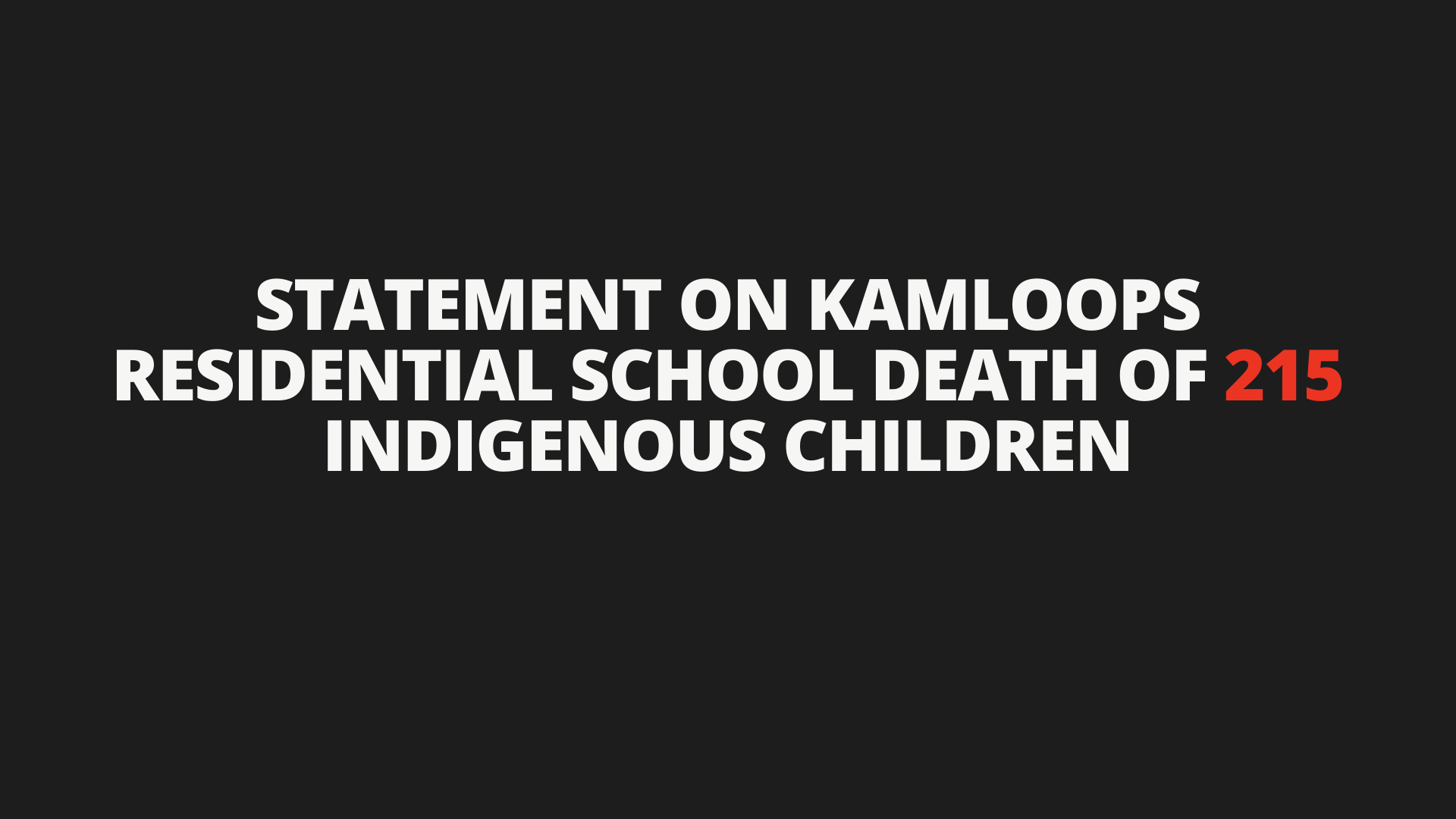
We extend our deepest condolences and stand in solidarity with the families, the Tk’emlúps te Secwépemc First Nation, residential school survivors and Indigenous communities across Canada. This legacy of residential schools haunts all of us in this country and we must stand together to address these wrongs that continue to cause trauma and suffering. We must face this truth in order to begin a reconciliation journey of healing.
We are deeply impacted by the gruesome discovery of the remains of 215 children buried at the site of Kamloops Indian Residential School. We mourn the horrifying loss of 215 children who had been stolen from their families by the State. We are struggling with how to respond to this national tragedy.
As an organization we continue to look at how we can decolonize and be inclusive. In 2017 we completed “A Journey to ReconciliAction: Calls to Action Report” after examining our policies, practices and procedures through the lens of the TRC Report. It is our guide and part of our commitment to First Nations, Inuit and Metis peoples.
We urge all organizations, institutions and governments to implement the Calls to Action as well as the Calls to Justice from the MMIWG Inquiry. We call upon the provincial and federal governments to support the full investigation of all residential school sites for unmarked graves. We call upon the Catholic Church to take responsibility for its role in the operation of schools and the criminal acts that were perpetuated against innocent children in their care.
Locally, we urge you to support the preservation of the “Mush Hole”, the former Mohawk Institute Residential School in Brantford now operated as part of the Woodland Cultural Centre. There has been an attempt by the Canadian Government to destroy all the evidence of Residential Schools. “Save the Evidence” is a campaign to raise awareness and support for the restoration of the former Residential School, and to develop the building into an Interpreted Historic Site and Educational Resource. We have made a contribution and urge you to do the same if able. It is a concrete way to support Indigenous (First Nations, Metis and Inuit) peoples and contribute to both truth and reconciliation.
https://woodlandculturalcentre.ca/the-campaign/
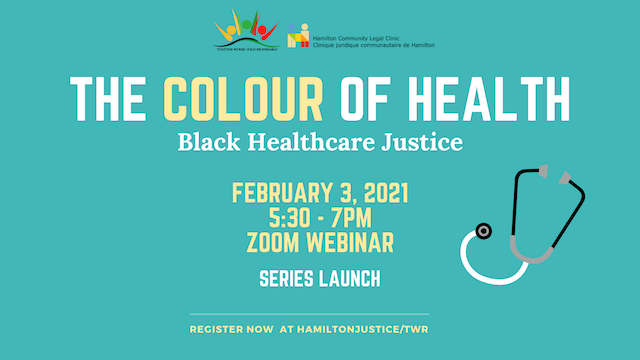
Please see this video recording of our event ” The Colour Of Health – Black Healthcare Justice” which was held on February 3rd, 2021.
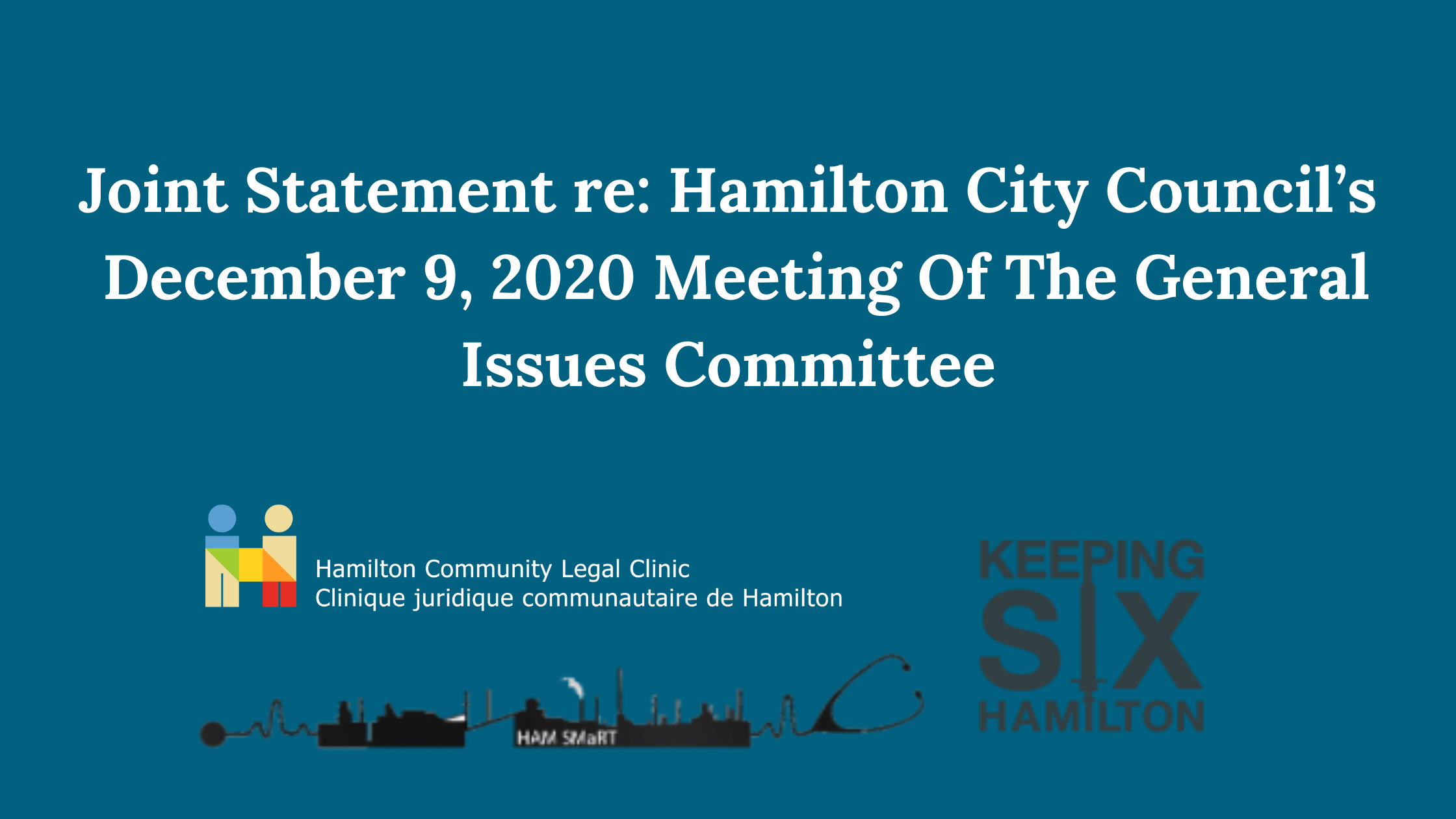
JOINT STATEMENT
The Hamilton Community Legal Clinic (HCLC), Hamilton Social Medicine Response Team (HAMSMaRT) and Keeping Six (K6) issue the following joint statement in response to Hamilton City Council’s December 9, 2020 meeting of the General Issues Committee, wherein an encampment update regarding expenses was on the agenda.
Some City Councillors have alleged that the encampment litigation was nothing more than a “stunt” that was deliberately launched on the Friday before a summer long weekend. We wish to set the record straight on the rationale and timing of the encampment litigation this past summer. For anyone interested in a comprehensive timeline of events, please see keepingsix.org/encampments for an interactive timeline of our interactions with the City on this issue. As previously stated we, along with Wade Poziomka from Ross & McBride, had reached out to the City’s legal counsel and Housing Services staff about our concerns regarding the dismantlement of encampments well before a motion for an injunction was filed. These concerns are well documented elsewhere and we will not reiterate them here.
While the City did agree to listen to our concerns, we had just started meeting with staff and counsel to come to an agreement . Throughout this process, we were insistent about our desire to resolve matters informally and out of court. We were also candid about the fact that, if the City were to plan a further dismantlement, it would force the parties into litigation.
On July 28, 2020, HAMSMaRT and K6 received a call from the Director of Housing Services advising that the encampment on Ferguson would be cleared on July 31, 2020. We sent emails and made calls to Housing Services, the General Manager of Healthy and Safe Communities Paul Johnson, and City Counsel. The leads on this file, Paul Johnson as well as the City’s legal counsel, were both on vacation when the call was made to dismantle the Ferguson encampment. The City staff and legal counsel who did respond were unable to make a written commitment that no one would be forcibly removed against their will. With less than three days to go, we were forced to file for an injunction to stop the dismantlement. On July 30, 2020 a Superior Court judge was satisfied that there was a risk of “irreparable harm” to encampment residents, and the injunction was granted. Of note, the City took no position on the injunction. The injunction was later extended on consent. If the City were interested in really looking at what prompted the injunction, they need look no further than who ordered the dismantlement of Ferguson while we were in talks with City staff as to how to resolve this out of court.
As such, it should be abundantly clear that the decision to file for an injunction before a long weekend was not a “stunt”. There was a long lead up that was full of communication between the parties, and never was the possibility of litigation unclear. The timing and necessity for the injunction was entirely in response to the City’s plan to dismantle the Ferguson encampment.
The injunction was an absolute last resort for us and even after it was granted, we continued to reach out to the City for an informal resolution. These efforts continued until the 11th hour, when the City agreed to enter settlement discussions in mid-September. An agreement was reached shortly thereafter. The vast majority of the legal fees incurred by the City would have been avoided had the City agreed to enter settlement discussions with us immediately after the injunction was granted, as we had proposed.
In the recent GIC meeting, the allegation that a tent drive created artificial homelessness was again raised. These allegations demonstrate a fundamental lack of understanding of the issues that have driven more people to sleep unsheltered across our entire country during this pandemic. City councillors in Hamilton alleging that the increase in people sleeping rough in our city was caused by the very people who work every day to serve these individuals is an embarrassment.
Last week’s GIC meeting also discussed the recent Defund the Police and Invest in Housing protest. A number of councillors are conflating the work of K6/HAMSMaRT and the Hamilton Community Legal Clinic with the Defund HPS organizers. The City of Hamilton has a rich history of political activism and social justice movements. There is not “one party” with “one individual” behind recent events. There are in fact many groups who are both deeply concerned about the housing and homelessness crisis, and committed to effecting change. Further, we take issue with the council’s smearing of the Defund HPS organizers. As an organization that has chosen to work through institutional channels, be it the City bureaucracy or the courts, we respect and deeply recognize the need for a diversity of strategies for achieving change. We believe that ire of those in council should be directed at the injustice, not those raising it for resolution.
In addition to misrepresenting the issues, some councillors have reduced their arguments to the level of personal attacks, namely against Dr. Jill Wiwcharuk, who has worked tirelessly to serve the community for more than a decade. The contorting of the advocacy Dr. Wiwcharuk does in the interest of her patients into “harassment and hijinks” is simply shameful.
This issue of housing is one of the most pressing of our times. It is exhausting and unproductive to repeatedly have to respond to unfounded allegations while we are working daily on the streets with our patients, clients and friends who are dying from the inaction. Currently, all signs point to a worsening not an improvement of the problem. We recognize and have repeatedly acknowledged that the problem of the housing crisis is bigger than anything the City has capacity to resolve on its own. Our simple request from the beginning of the pandemic was to ask the City to refrain from doing harm by further dislocating people who had nowhere else to go.
We are proud that our actions have played a role in achieving some measure of that modest request. There is much work to be done, but there has been a shift in culture with respect to encampments and how to engage with people in ways that don’t do more harm.
But now we need to do more than just do no harm. We need honest, intelligent conversations that trade in facts, and not attacks and deflections of responsibility. We need imagination and ideas that both build and depart from the status quo. Let’s build on City and community partnerships and work together for an inclusive community, actively engaged in making Hamilton a better place for everyone.
Wednesday, December 16, 2020
Dr. Elizabeth Richardson
Medical Officer of Health, City of Hamilton elizabeth.richardson@hamilton.ca
Dear Dr. Richardson,
The purpose of this letter is to draw your attention to your legal authority and responsibility to order the suspension or restriction of enforcement of residential eviction orders – a measure urgently needed to help reduce the spread of COVD-19 and the threat that it poses to health. As our city’s Medical Officer of Health, we demand that you act upon the overwhelming evidence that residential evictions exacerbate homelessness, overcrowding of shelters, circulation between households, and other phenomena that encourage the spread of this virus, as well as the human suffering and death that result from it.
The Superior Court of Justice had suspended residential eviction enforcement in Ontario from mid March until the end of July 2020, but has since concluded that it does not have jurisdiction to reconsider or reverse that decision. The Court has instead held that the question of whether to suspend evictions is a public policy decision for government to make.
Last week, the Ontario Legislative Assembly unanimously adopted a resolution calling for the suspension of residential eviction enforcement in this province until the end of the COVID-19 pandemic. The passage of that resolution came after similar calls by the City of Toronto, the Regional Municipality of Peel and the Toronto Board of Health seeking provincial action on this matter.
However, none of those resolutions are binding on government, and so enforcement of residential evictions continues as though there is no pandemic. In our view, as the government official tasked with preventing the spread of disease and protecting the health of the people of Hamilton, you have the power and responsibility to make the decision to suspend the enforcement of residential evictions during the COVID-19 pandemic. This decision is especially yours to make because it requires the application of public health evidence to temporarily restrict an activity likely to spread a communicable disease.
Section 22 of the (“HPPA”) gives you, as a medical officer of health, the power to make orders that “may require a person to take or to refrain from taking any action that is specified in the order in respect of a communicable disease.” Your order may be directed at one or more classes of persons (e.g., residential landlords seeking to enforce eviction orders, and Court Enforcement Officers or the “Sheriff”), and may be binding on other branches of government.
In September, the U.S. Centres for Disease Control and Prevention (CDC) declared
residential evictions of tenants “detrimental to public health control measures to slow the
spread” of COVID-19 and instituted a nation-wide partial moratorium. The CDC were acting on evidence that enforcement of residential eviction orders not only causes persons to circulate within outdoor encampments, shelter spaces, public transit, and acute health care settings – but even in the best-case scenario, such evictions cause entire households to move into other households, increasing contact between persons of varying ages, health conditions, and activity levels within the community.
As the weather turns colder and the second wave of COVID-19 continues, all of these ordinary consequences of residential eviction pose an added health risk not only to low- income and racialized communities most evicted, but to their families, friends, and ultimately the public at large. Tenants facing eviction may end up as patients in a hospital emergency room or long-term care facility; some of them already work as front- line staff in those facilities or in our factories, kitchens, grocery and hardware stores.
All our political leaders seem to agree that something should be done. The CDC took this action months ago. It is time for you to act.
Sincerely,
Hamilton Community Legal Clinic
CC: Hamilton Public Health (publichealth@hamilton.ca)
Ali Naraghi – Staff Lawyer
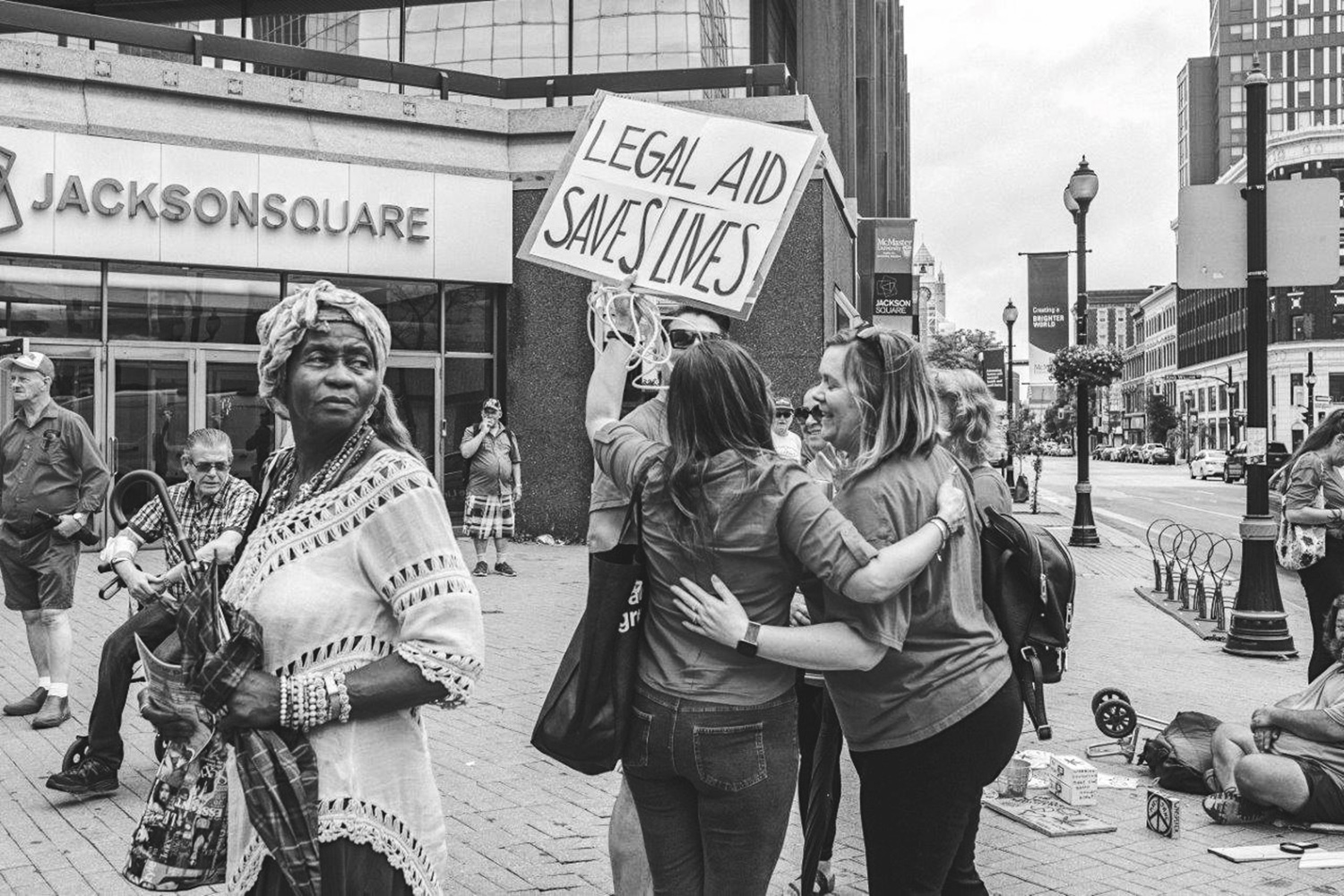
December 8, 2020
The Honourable Doug Downey Attorney General of Ontario McMurtry-Scott Building, 11th Floor 720 Bay St
Toronto, ON M7A 2S9
The Honourable Todd Smith
Minister of Children, Community & Social Services
7th Floor, 438 University Ave. Toronto, ON M5 G 2K8
Sent via email: Doug.downey@pc.ola.org, Todd.Smithco@pc.ola.org
Dear Attorney General Downey and Minister Smith,
RE: ALARMED FOR THE FUTURE OF THE SOCIAL BENEFITS TRIBUNAL AND APPEALS PROCESS
We are writing on behalf of the Steering Committee for Social Assistance, the community legal clinics’ working group made up of representatives from across the Province with the participation of specialty clinics including the Income Security Advocacy Centre (ISAC) and Community Legal Education Ontario (CLEO) as well as the Clinic Resource Office (CRO). The Steering Committee seeks opportunities to improve social assistance policies and procedures through ongoing communication with government, the community legal clinics, and other affected groups.
Governments, through the Ontario Disability Support Program and Ontario Works, have sought to support Ontarians with disabilities and others who would otherwise live in poverty. Understandably, the application and appeal process are constantly under scrutiny. However, we are concerned that the Social Benefits Tribunal is being severely curtailed, and we are alarmed by signals that it may be in the process of being eliminated.
Legal clinics are reporting that some of their clients will have to wait until 2022 to get their appeals heard. We believe that the delays are in part due to the shortage in the number of current adjudicators at the Tribunal. Having people who live in deep poverty wait for over a year to get benefits causes undue hardship, which is now felt even more given the Covid-19 Pandemic. We support a Social Benefits Tribunal that is resourced with an appropriate number of adjudicators, so that appeals can be heard in a timely way. We urge you to take action to address this important access to justice issue.
The right to an appeal process at the Tribunal is enshrined in legislation, and it is a vital one that needs to be preserved. Even in the best of application systems, it is only fair and reasonable to apply a check on the decision-making of Ministry staff. We call on the provincial government to publicly declare that it will preserve the important independent role of the Social Benefits Tribunal in ensuring that no one is wrongly denied the benefits they need for their survival.
Sincerely, Laura Hunter
Michael OIlier
Co-Chairs of the Steering Committee on Social Assistance
Cc. Sent via email to:
Gurratan Singh, Critic, Attorney General, New Democratic Party. GSingh-QP@ndp.on.ca Lisa Gretzky, Critic, Community and Social Services, New Democratic Party LGretzky- QP@ndp.on.ca Lucille Collard, Critic, Attorney General, Liberal Party. LCollard.mpp.co@liberal.ola.org Michael Coteau, Critic, Community and Social Services, Liberal Party.Mcoteau.mpp.co@liberal.ola.orgMike Schreiner, Leader, Green Party. Mschreiner-co@ola.org Sean Weir, Executive Chair, Tribunals Ontario. Sean.Weir@ontario.ca Stacey Ferguson, Associate Chair, SBT.Stacey.Ferguson@ontario.ca Sharon Buchanan, Counsel, Tribunals Ontario. Sharon.buchanan@ontario.ca